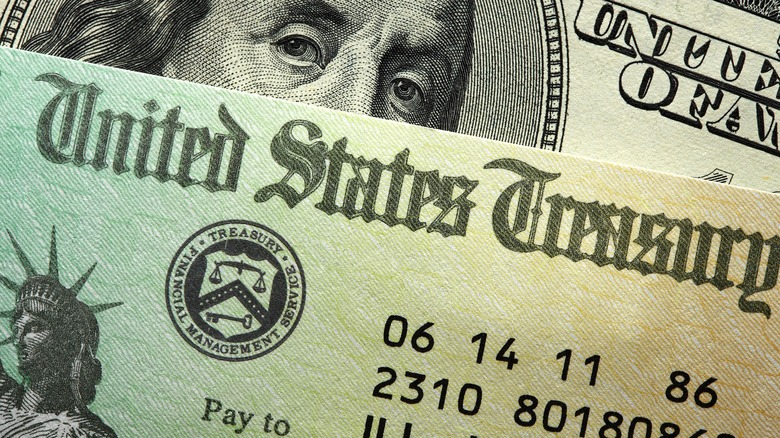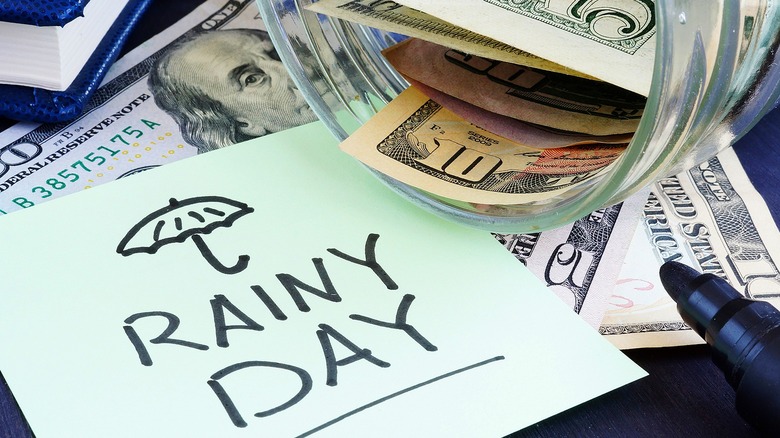The Big Mistake You Shouldn't Make With Your Tax Refund
For 2023, the average tax refund issued by the IRS was $2,903, an 11% decrease from 2022 but still nearly $3,000, which you can obviously put to use in many different ways. While it may be tempting to spend this windfall on something you've been wanting, like new tech or a well-deserved vacation, splurging would be a financial mistake if that money could help you to better your financial situation instead. If you have outstanding debt or perhaps don't yet have a fully funded emergency fund, a few thousand dollars could go a long way in getting your finances (back) in order.
Splurging with your tax refund can prove a more costly mistake than you may realize, too, as while the money may bring you happiness in the moment, if you do have financial needs, those will surely only continue to grow. And, likely, you aren't going to have another sudden influx of money to help you remedy the situation either. That's what the tax refund could have been, but if you choose to use it to splurge instead, when you do need money later on, it'll be too late to get it back, leaving you to turn to other sources for help, such as high-interest credit cards, short-term payday loans, or asking family to borrow money.
What a tax refund really is
Though it might seem like it, a tax refund isn't magic money; it's your money. Money you overpaid the government in taxes during the past year, and which the government is now returning to you. So, while you may think of a big refund as some kind of bonus, which you can therefore spend however you like since you didn't have it before, consider it another way: It's money you already saved, and so putting it toward your current financial needs or your future can be a smart way to maximize those savings.
In a spring 2022 survey of more than 1,000 taxpayers, LendingTree found that 46% of those polled planned to save their tax refund, meaning they were in a well-enough financial situation that they did not need to use the money to pay off any debt — and, thus, could've splurged the refund, too, without facing real consequences. As LendingTree's chief credit analyst Matt Schulze explained, "The lower your debts, the easier it is to save. And the more you save, the less susceptible you are to falling into a debt cycle." If, however, you're not financially in such a place and you splurge your tax refund, it's one mistake you'll likely come to regret sooner rather than later, like when the next inevitable rainy day arrives.
Reducing (or eliminating) your tax refund
One way to avoid the big mistake of splurging your tax refund is to reduce it from the start, which means adjusting your tax withholding so that you pay less in taxes throughout the year and increase your take-home pay instead. If you received a refund the previous year, and nothing has changed in your job or life since, you can estimate how much you're overpaying each paycheck and adjust your W-4 data accordingly. That money you were overpaying in taxes, which amounts to an interest-free loan to the government, could instead be used to improve your monthly cash flow, help to pay for household expenses, or add or grow your savings.
Of course, for some, having that extra money each paycheck could be difficult to resist. They feel they'll spend it on things they don't necessarily need — essentially, splurging the money throughout the year rather than when they get their tax refund in the spring. In fact, some people overpay their taxes on purpose because it's a way for them to save so that they don't splurge with it. If they can't access the money, they can't spend it, right?
Still, financial experts, like Bankrate senior industry analyst Ted Rossman, say it's a better idea to keep your money with you, rather than give it over to the government to hold on to. Said Rossman, "While some people prefer to receive a lump sum because they fear they would fritter away the bits and pieces throughout the year, it's generally better to adjust your withholding, so you get more money from each paycheck and essentially break even at tax time."


